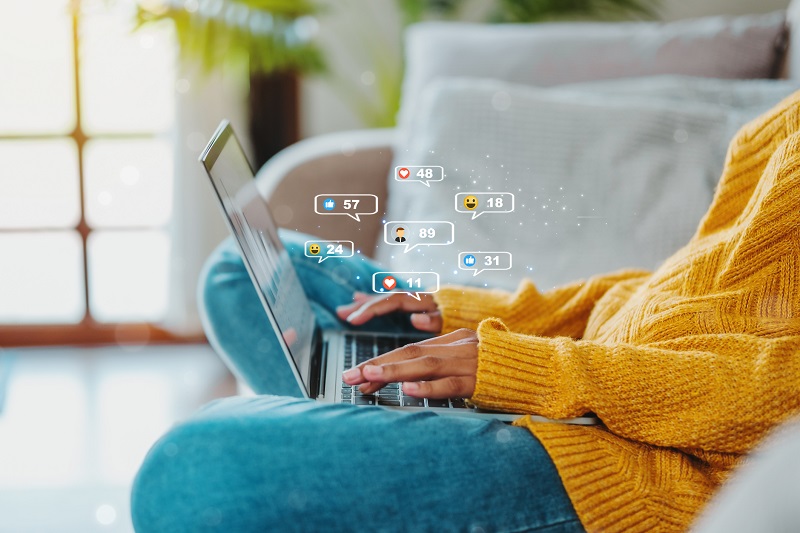Spot the Signs: Addiction to Social Media

April 23, 2024
What’s the first thing you do when you wake up? Do you grab your phone and open a social media app?
From scrolling through Instagram to browsing endless TikTok videos, social media is a natural part of life for many. And because it's considered so "normal,” it’s easy to get lost in the virtual world of likes, comments, and shares. What many people don't realize is that excessive use of social media can lead to addiction, which gradually impacts mental and emotional well-being.
“Social media addiction is something that everyone in the media is becoming concerned about," says psychiatrist Justin Kei, M.D. "It's not technically a disorder recognized by the psychiatric profession, but the symptoms are similar to other types of addictions that we do recognize."
Understanding Social Media Addiction
Also known as problematic social media use, social media addiction is a behavioral addiction characterized by the excessive and compulsive use of social media platforms. While it may seem harmless to spend hours scrolling through Facebook or TikTok, studies show it can harm a person’s mental health over time.
Research suggests that social media addiction shares similarities with substance addiction in terms of brain activity.
- When we receive likes, comments, or messages on social media, our brains release dopamine, a neurotransmitter associated with pleasure and reward.
- This dopamine hit creates a feeling of satisfaction, encouraging us to find more engagement on social media to keep experiencing the same pleasure.
“Because these platforms were designed to be used effortlessly, they end up being easy places to turn when you’re not feeling well mentally,” says Dr. Kei.
The Impact of Social Media on Mental and Emotional Health
Using social media too much can have profound effects on mental and emotional well-being. Studies have linked social media addiction to increased feelings of loneliness, depression, anxiety and low self-esteem. When you’re constantly comparing yourself to curated online personas, you can develop unrealistic standards and start to feel inadequate. The constant barrage of information and notifications can also raise your stress levels and make it challenging to concentrate.
"There's a lot of misinformation and distorted imagery on social media that make people feel worse,” explains Dr. Kei. “Seeing only the good on social media can cause people to feel bad about themselves."
Social media addiction doesn’t only affect you while you’re awake — it can also disrupt your sleep patterns. One study found that students who used social media excessively had worse sleep and academic performance. When people get the urge to check their phones or use social media late into the night, it impacts their overall sleep quality and duration. This lack of quality sleep can make any existing mental health issues worse and impair cognitive function.
Spotting the Signs of Social Media Addiction
Recognizing the signs of social media addiction is the first step toward addressing the issue. Some common signs include:
- Preoccupation with social media: Constantly thinking about or planning the next time you can check social media
- Withdrawal symptoms: Feeling anxious, irritable, or restless when unable to access social media
- Neglecting responsibilities: Prioritizing social media over work, school, or personal responsibilities
- Impact on relationships: Spending more time on social media than with friends or family, or experiencing conflict due to social media use
- Loss of interest: Losing interest in hobbies or activities that were once enjoyable in favor of spending time on social media
Taking Control and Seeking Help
If you or a loved one are showing signs of social media addiction, it's essential to take proactive steps to address the issue. While there isn’t a specific treatment available for social media addiction, behavioral health professionals can help. Connecting with an expert is especially important if you have a co-existing mental health condition, such as anxiety or depression, and you’re also worried about your social media use.
Beyond seeking professional help, Dr. Kei advises spending time each day or each week away from your smartphone, computer or tablet.
“Do things that are good for your mental health, like exercising, getting outside for some sunlight and fresh air, and engaging with people in person,” suggests Dr. Kei.
In addition to these ideas, you could also try to:
- Set boundaries: Limit your daily social media usage and establish designated times for checking your accounts
- Practice mindfulness: Be mindful of your online behavior and how it makes you feel. Take breaks when needed and do activities that promote your well-being
- Seek support: Reach out to friends, family, or mental health professionals for support and guidance
- Use technology tools: Consider using apps or features that track and limit your social media usage
- Focus on real-life connections: Prioritize face-to-face interactions and nurture meaningful relationships offline
"Before you ever open a social media app or website, make sure you understand why you're using it," advises Dr. Kei. "Be intentional with why you’re using it so you can use it in healthy ways."
Hopping onto a social media platform for the benefit of your mental and emotional health is possible. For example, someone who has depression can use social media to connect with people they trust and find the support they need from an online community.
“There are positive studies out there of people who’ve used social media intentionally and have benefited from it,” says Dr. Kei.
Remember, breaking free from social media addiction is a process, and it's OK to seek help along the way. By recognizing the signs, understanding the impact, and taking proactive steps, you can regain control of your digital habits and prioritize your mental and emotional well-being.
Next Steps & Resources
- Meet our source: Justin Kei, M.D.
- To make an appointment with Dr. Kei or another physician near you, call 800-822-8905 or visit our website.
The material provided through HealthU is intended to be used as general information only and should not replace the advice of your physician. Always consult your physician for individual care.







